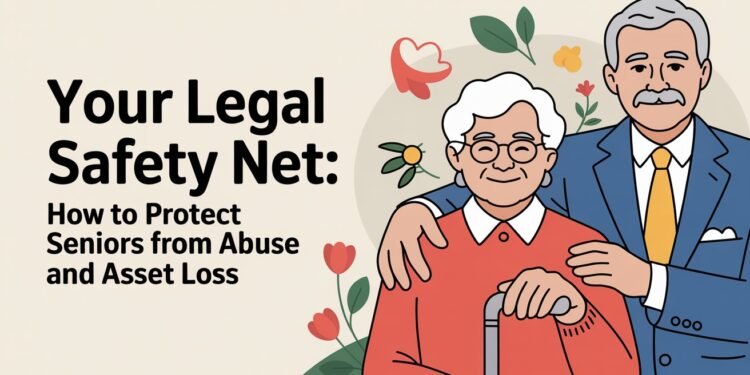Aging brings many changes—some beautiful, some challenging. But one of the hardest realities is this: many seniors are vulnerable to both abuse and financial exploitation. These risks often go unnoticed until it’s too late.
Creating a legal safety net is one of the most important things families can do to protect their loved ones’ dignity, health, and legacy. Whether your parent is living independently, receiving in-home care, or in a nursing home, legal tools and proactive planning can make all the difference.
Here’s how to protect the seniors you love from mistreatment and financial loss.
1. Recognizing the Hidden Threat of Elder Abuse
Elder abuse doesn’t always look like bruises or shouting. It can be subtle, emotional, or purely financial. In nursing homes, it might appear as neglect, overmedication, or intimidation. In private settings, it could come from an overwhelmed caregiver or even a family member.
Common types of elder abuse include:
- Physical abuse: Hitting, pushing, or inappropriate use of restraints
- Emotional abuse: Yelling, humiliation, isolation
- Neglect: Failure to provide basic care, food, or hygiene
- Financial exploitation: Stealing money, manipulating documents, or pressuring for access to accounts
The hard part? Many seniors are afraid to speak up. Others may be unable to due to cognitive decline.
Warning signs:
- Unexplained injuries or frequent hospital visits
- Sudden changes in behavior or mood
- Missed medications or signs of dehydration
- Unusual bank activity, unpaid bills, or missing valuables
Read more: Legal Options for Elder Abuse in Nursing Homes
What you can do:
- Keep in regular contact and visit often
- Pay attention to changes in appearance or behavior
- Report any concerns to Adult Protective Services or the facility’s ombudsman
Legal protections exist, but families need to act quickly and document everything.
2. Legal Tools That Empower Seniors and Their Families
Having the right documents in place gives trusted individuals the authority to step in—before a crisis.
Power of Attorney (POA):
Allows someone to manage the senior’s finances, pay bills, handle insurance, and more. A durable POA stays in effect even if the person becomes incapacitated.
Health Care Proxy / Medical POA:
Designates someone to make medical decisions if the senior is unable to do so.
HIPAA Authorization:
Grants permission for family members or proxies to access medical records and talk to providers—critical during emergencies.
Guardianship or Conservatorship (as a last resort):
If no legal documents are in place and a senior is being abused or financially exploited, a court may need to appoint a guardian to protect them. This process is slower and more complex, which is why proactive planning is always better.
Tip: Make sure copies of these documents are accessible to trusted family members and healthcare providers.
3. How Estate Planning Can Prevent Financial Vulnerability
Financial abuse is one of the most common and damaging forms of elder exploitation—and it often happens when estate planning hasn’t been done.
Without proper planning:
- Seniors’ assets may be vulnerable to manipulation
- Their estate could be tied up in court
- Family members may disagree about how to divide property or manage care
That’s where estate planning comes in.
Tools that protect assets:
- Revocable Living Trusts: Allow seniors to retain control of their assets during their lifetime while avoiding probate later.
- Transfer-on-Death (TOD) designations: Let bank and investment accounts pass directly to beneficiaries without court involvement.
- Properly titled property: Joint ownership with right of survivorship or trust-held real estate can avoid delays.
- Beneficiary updates: Keeping life insurance, retirement accounts, and pensions updated ensures smooth transfers.
Explore more: How to Avoid Probate: Estate Planning Tips for Seniors
Bottom line: Smart estate planning reduces the risk of financial abuse and court entanglements—and preserves your loved one’s wishes.
4. Caregiver Advocacy and Oversight
Legal tools are only part of the safety net. Active advocacy plays a key role.
What caregivers and family advocates can do:
- Monitor care quality: Regular visits and check-ins make abuse or neglect easier to spot.
- Track finances: Help review statements, manage budgets, and spot suspicious transactions.
- Stay organized: Keep a binder of legal documents, medications, doctors, and care schedules.
- Use technology: Video calls, smart pill dispensers, and bank alerts help you stay connected—even from a distance.
If something feels off, trust your instincts. Ask questions, dig deeper, and if needed, file a formal complaint or seek legal intervention.
5. When to Get Legal Help
There are times when DIY planning or family advocacy isn’t enough.
You should consult an elder law attorney if:
- You suspect abuse or financial exploitation
- You need help with guardianship or conservatorship
- Estate documents are outdated or missing
- The senior is entering long-term care and asset protection is a concern
- You need help avoiding probate or Medicaid penalties
Helpful resources:
- Adult Protective Services (APS)
- Long-Term Care Ombudsman (for nursing home concerns)
- Local legal aid organizations for seniors
- Elder law and estate planning attorneys
Conclusion: Protection Begins With Planning
Protecting aging loved ones means more than providing physical care—it means setting up the legal tools that safeguard their health, money, and dignity.
Here’s a quick recap of how to create a legal safety net:
- Understand the signs and risks of elder abuse
- Put legal documents in place: POA, health care proxy, HIPAA release, and estate plan
- Use trusts and TOD accounts to protect assets and avoid probate
- Stay engaged as an advocate—monitor care, finances, and overall well-being
- Seek professional help when needed
Your proactive steps today can prevent heartbreak tomorrow.




